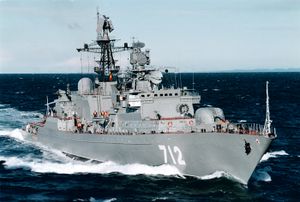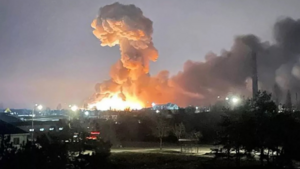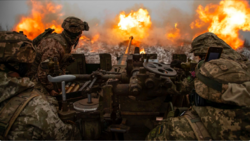Aberso–Illyrian War
| Aberso-Illyrian War | |||||||
|---|---|---|---|---|---|---|---|
| Part of Anti-Communist Wars of the 21 Century | |||||||
 A New Illyrian frigate sailing out from Andrafolia to fight in the Second Battle of the Claufenese Sea | |||||||
| |||||||
| Belligerents | |||||||
| |||||||
| Commanders and leaders | |||||||
|
|
| ||||||
The Aberso-Illyrian War is an ongoing military conflict between New Illyricum and Abersiania which began on September 23, 2023. Following the uncovering of the Shaoyu Island genocide and the OU military intervention in Shaoyu tensions began to arise between the Illyrian and Abersianian primarily over control of the Claufenese Sea and the shipping lanes which run through it.
Contents
Background
Anti-Communist Movements in the 21 Century
Morovan Civil War and the Morovan Crisis
In 2019, in the communist island nation of Morova, after Premier Marko Remeus was impeached by the Parliament of Morova and Fyodor Ivanovich took power in a coup d'état. However revolutionary forces under Alyosha Karamazov defeated Ivanovich in the Morovan Civil War resulting in a military dictatorshipp being established. Peacekeeping troops from the International Coalition for Morova (INTCOMOR) were sent to defeat the communist dictatorial military forces on the island. INTCOMOR not only had goals to remove the communist forces of Karamozov from power, they also wished to gain access to the oil reservoirs which populated Morova's southern coast. In a one year war, INTCOMOR eventually defeated Karamazov and his submarine fleet at the Battle of the Glaceis Ocean on March 31, 2020, capturing the communist dictator. Karamazov was executed in Quebecshire four days after the battle and INTCOMOR eventually ceded the Island of Morova to Groffenord, ending one of the last communist strongholds in Ecros.
OU military intervention in Ajakanistan
The country of Ajakanistan on the continent of Ostlandet was a long standing communist nation until 2022, when tensions began to rise between Ajakanistan and Paleocacher after a Paleocacherian ship captured an Ajaki trawler sailing through their waters and then refused to return the Ajaki fisherman to Ajakanistan on the basis that they had allegedly committed murder, attempted murder, and several other crimes relating to violating Paleocacherian water territory. Tensions continued to rise between the countries after a small skirmish between naval vessels and after the Government of Paleocacher began intiatiating sanctions on the Ajaki people. On March 22, 2022, Ajaki citizens highjacked the Paleocacherian Trans-Oceanic Airlines Flight 266 and demanded the release of the fishermen, however Paleocacherian troops refused their demands and rescued the bystanders on the flight. In October of 2022, after the assassination of Leonid Luboshov, the Director of the National Ajaki Intelligence Agency, at the hands of Pavulturilori agents, Ajaki Supreme Leader Vladimir Kareiv authorized the mobilization of three ships in the Romanyan Sea to counter the naval power of Pavulturilori Navy. In the Battle of the Romanyan Sea, Pavulturilori forces won a pyrrhic victory, ending the recently mobilized Ajaki fleet. The Government of Pavulturilor then mobilized forces of the Cooperation and Development Coalition (CODECO), a large international alliance, against Ajakanistan. In addition to mobilizing CODECO, Pavulturilor called for the arrest of Vladimir Kareiv on charges of violating Pavulturilor's sovereign territory to the Terraconserva Council of Nations (TCN). Several members of the Ajaki government, including Kareiv, and Mikhail Ryzhikov, the commander of the Ajaki Navy, and others. Paleocacher then called a meeting of the Council of Ostlandet, which condemned Ajakanistan and increased sanctions. Kareiv, who was in attendance, was arrested outside the meeting place and detained by the Ostlandet Union (OU). Soon after Kareiv's arrest, Ajakanistan collapsed into anti-government protests eventually leading to the establishment of the Free Council of Ajakanistan, which was a pro-monarchist governmental body, which most OU counties recognized as the true government of Ajakanistan. On November 22, delegates from the Free Council convened a meeting with OU representatives in Castlederg, Gjorka, however in the course of negotiations the Ajaki communist government launched a missile strike, killing over 200 civilians and injuring over 3,000 more. Gjorka immeadiatly called for support from New Gandor and together they began an invasion of Ajakanistan. Soon the OU declared an official intervention to other throw the communist military government. The invasion lasted 5 months, until Supreme Leader Viktor Kavolskiy announced the communist government's surrender on March 22, 2023.
Discovery of the Akvatika Island Genocide and the OU military intervention in Akvatika
In late August of 2023, agents of the National Security Service of Pavulturilor infiltrated Akvatika Island, a territory of the communist nation of Zloveshchiy, and found evidence that the Zloveshchiyian Government had perpetrated a genocide upon the Akvatikan people since gaining control of the island from Jackson in 1969 to the modern day. Pavulturilori agents found Zloveshchiyian Exterimination Camps and other incriminating evidence implicating the communist government as having killed over 10 million people. Soon after finding this evidence, the Ostlandet Union declared Akvatika as Monsilvan (The island is to be named as (Shaoyu for the remainder of this article) property and initiated the OU military intervention in Shaoyu to remove the Zloveshchiyians from the island. On September 29, the last of the Zloveshchiyian Army surrendered Shaoyu to the OU Task Force for Shaoyu (OUTFS), who currently occupy the island.
Neosurian Political Tensions in the 21 Century
Ferunian Separatist War
In New Illyricum in the early 2000s, dissent began to grow amongst many people after continued political and cultural divides drove apart many Illyriae and tore the Congress of New Illyricum in two. This led to many anti-government protests, especially in Southern Illyricum in Ferunicum S.S and The Eisley S.S, where several large communist anti-Illyrian factions based. Two major factions, the People's Union for a Free Ferunia and the Ferunian Liberation Army, both based out of Ferunia, began a plan to overthrow the Illyrian governmental power in Ferunicum. The united factions originally planned a terrorist bombing attack on the Congressional Hall however this plan was eventually abandoned and replaced by a much larger scale plan to capture the city of Ferunia and establish a new Socialist Republic of Ferunia. The plan was overseen by Marcus Quintillius who managed to obtain weapons from illegal arms dealers in The Eisley Savannah and gathered up massive amounts of recruits through rallies and protests, which caught the attention of Illyrian officials. The Grand Marshall of New Illyricum, Julius Fabius, declared that all Illyriae must "Unify under the banner of communism" and must "set aside their petty disagreements and displeasures", soon afterwards several hundred troops were sent on high alert to search Ferunia for the separatist faction's base, however the base was not found. On October 10, in a series of coordinated assaults, separatist forces captured the Congressional buildings in Trurnia, Ferunia, Marjanovič and Nosterus, and declared the Socialist Republic of Ferunia with Quintillius as it's first President. Fabius quickly counter-attacked the uprising, and in a two year war which ravaged the south of New Illyricum and killed over 150,000, the New Illyrian government eventually gained victory, however the region has remained unstable ever since the long war.
Judea Crisis
During the early 21st century, the Islamic State of Sconia, which had been led by Caliph Ali Al-Nour for over two decades, claimed the region of Judea, which at the time was ruled by the Kingdom of Pavulturilor, which resulted in heavy tensions between the Islamic country and Pavulturilor, it's devoutly Jewish neighbor. After relations continued to strain, in May of 2008 Ali Al-Nour issued the executive order for the Sconian Defense Forces to invade Judea. Sconian forces quickly defeated the minimal soldiers of the Royal Pavulturilori Army who were in Judea, however the Sconian Air Force was defeated by the Royal Pavulturilori Air Force, which prevented Sconia from establishing their rule in the region. The Sconian Army, however, continued driving north towards Dăbuza, the capital of Pavulturilor, and began an assault on the city of Fălița in early July. The siege lasted for a month before Pavulturilori forces drove out the invaders eliminating all of the momentum of the Sconian assault. In late July, King Menakhem Melekh V signed a treaty which made Pavulturilor a full member of CODECO, and CODECO member states, especially Creeperopolis began sending significant aid, both military and material, to aid the war effort. Melekh V and General Eliahu Beggin devised Operation Sabie si Scut which relied heavily on Creeperian Aircraft to fuel a large scale counter-offensive into Sconia. CODECO forces quickly dismantled the Sconian army and soon reached Aktonia, the Sconian capital, where they captured Al-Nour on November 28, 2008, ending the war.
Establishment of the Democratic Republic of Pavulturilor
In early December of 2009, shortly after the end of the Judean war, a devout communist supporting group in the Kingdom of Pavulturilor, known as the Pavulturilori People's Army (PPP), began a series of terrorist attacks against the Pavulturilori Nobility. These attacks, which were met with almost universal condemnation by every non-communist nation, killed over 2,000 civilians in the course of a week. After the attacks failed to cause any real infrastructural or governmental damage outside of civilian deaths, the PPP ceased its attacks on December 19, 2009. The PPP remained relatively dormant and Pavulturilor was generally at peace, until early August, 2012. The communist rebels, led by Urial Ben-Yuval, planned a systematic attack on the Royal Palace in Dăbuza in an attempt to kill Menakhem Melekh V and the Royal Family of Pavulturilor. In an attack known as The Midnight Affair on August 12-13, 2012, communist forces attacked the palace and after about three hours stormed the palace and killed Menakhem Melekh V and several members of the royal family and declared the establishment of the People's Socialist Republic of Pavulturilor. However the new government was short lived, as during their broadcast announcing the victory the communist forces were stormed by members of the Pavulturilori Armed Forces who killed the communist soldiers in the palace and took control of the capital. The leader of the army, Meir Cohen, announced the end of the Kingdom of Pavulturilor and exiled the Royal Family, establishing the Provisional Authority of Pavulturilor and naming himself as the leader of a new Cohenist state. Ben-Yuval and the PPP soon began attacks in the Dubătemir Region in an attempt to remove the provisional governments hold in the region and sparse fighting continued for 10 years. On September 22 members of the PPP captured the Office of the High Regional Comissar of Dubătemir and forced the Pavulturilori government out of the region. The Battle of Dubătemir raged in the city between communist and governmental forces, however after almost a month of fighting, on November 11, the communist force was defeated and removed from the city. Ben-Yuval was captured and executed, and the Pavulturilori People's Army was eradicated as a result of the battle. Pavulturilor emerged stronger and more unified as a result of the 10 year conflict and became the dominant military presence in Neosur.
Sconian Crisis
The Troubles
From the early 1950s to the current day, the country of Terranihil has been torn apart by a pseudo-religious conflict known as The Troubles
Prelude
Claufenese Sea Crisis
On August 20, 2023, Tumish President Griffin Airhourser and the Congress of New Illyricum agreed to one of the largest oil agreements in the history of Terraconserva, with Tumland agreeing to transport over 210,000 barrels of oil to Port Ignatius in exchange for 32,760,000 Gregoris. Traveling through the tension filled Romanyan Sea, New Illyricum deployed a flotilla from their fleet to convoy the Tumish oil tankers. The tankers successfully unloaded their oil onto Illyrian soil on September 3. The Government of Tumland faced heavy scrutiny, primarily from two major Alliance of Central Ecrosian States (ACES) powers, Kivu and Jackson, about trading with a communist country, however Airhourser seemed to care very little about the ideology of New Illyricum. Even after the fulfillment of the oil agreement, Tumish-Illyrian trading continued. One of Tumland's other largest trade partners, the island nation of Abersiania, was wary of the trading ships that sailed near, and in some cases through, Abersianian waters, and deployed ships to defend the Claufenese Sea, their naval border with New Illyricum. Illyrian-Abersianian tensions continued to mount after the Prime Minister of Abersiania, Jeremy Hausch, accused New Illyricum of having a tyrannical government, to which the Government of New Illyricum responded by heavily increasing naval patrols and banning travel to Abersiania. On September 17 tensions between Abersiania and New Illyricum took turn when a Tumish trading ship heading to Port Ignatius carrying oil blew off course into Abersianian waters and was seized by the SSH Schoefengen at 07:17, KMT, in a dense fog. The ship was held for about 3 hours before the Tumish ship and it's cargo were escorted back to Tumland. In order to prevent a similar incident, Illyrian ships were deployed to defend shipping lanes along the Apollonian coast and too enforce New Illyricum's claim on the Claufenese Sea. In response, Jeremy Hausch, the Prime Minister of Abersiania, ordered Abersianian ships and planes to begin constant patrolling of the Claufenese Sea. Tensions came to a head on September 22, when the SSH Schoefengen came to a standoff against the NIS Andrafolia in the Claufenese Sea. Illyrian Captain Lucius Germinius was ordered by the New Illyrian Naval Command to alert Captain Henrich Flagten and the Abersianian Navy of a 24 hour ultimatum to withdraw or face military action.
Course of War
Second Battle of the Claufenese Sea
At 01:00 on September 23, a series of military dispatches were sent out by the Illyrian Naval Command, which commanded the 106th Fighter Division, under the command of Colonel Marcus Kalendus, to prepare to engage the Abersianian Air Force. Abersianian Captain Henrich Flagten called for the pulling out of all Abersianian reserve ships and planes in order to defeat the New Illyrian fleet, which was larger strictly based on number of ships. As time winded down on the 24 hour ultimatum, repeated attempts were made by both sides to convince the other to withdraw, however both sides remained steadfast in their refusal to withdraw from the Claufenese Sea. At 21:55 communications between Abersiania and New Illyricum were cut short, and at 22:00 the ultimatum expired, and the NIS Andrafolia opened fire. Heavy combat continued until about 02:00 on September 24, when the Abersianian force had clearly gained air and by extension naval superiority. At 02:53 New Illyrian Admiral Mario Antinus issued the order for the Illyrian ships to withdraw to friendly waters, and the final shots of the battle were fired at about 03:07.
Pretoria Palace Summit
Only an hour after combat in the Claufenese Sea began, the government of Tirol, a neutral country, extended an offer to the Abersianian and Illyrian ambassadors in the city of Innsbruck, offering to be a neutral third party to mediate negotiations to end the conflict. The Government of Tirol also invited delegates from Kivu, Jackson, and Eleutherios to represent the interests of ACES, and appointed Uorsin Sante as mediator for the negotiations. All four countries agreed to send delegates to Pretoria Palace to negotiate in the coming days, and after a day, negotiations started on the 25th of September. The main focuses of the negotiations were the status of militarisation in the Claufenese Sea, introduction of free and fair elections to the governing system of New Illyricum and a protection guarantee, as tensions between New Illyricum and CODECO, especially Pavulturilor. The last point of these focuses was a main subject of discussion, as if CODECO were to invade New Illyricum and set up a puppet, ACES would lose a significant advantage in military superiority over the Andaluzian Sea.



